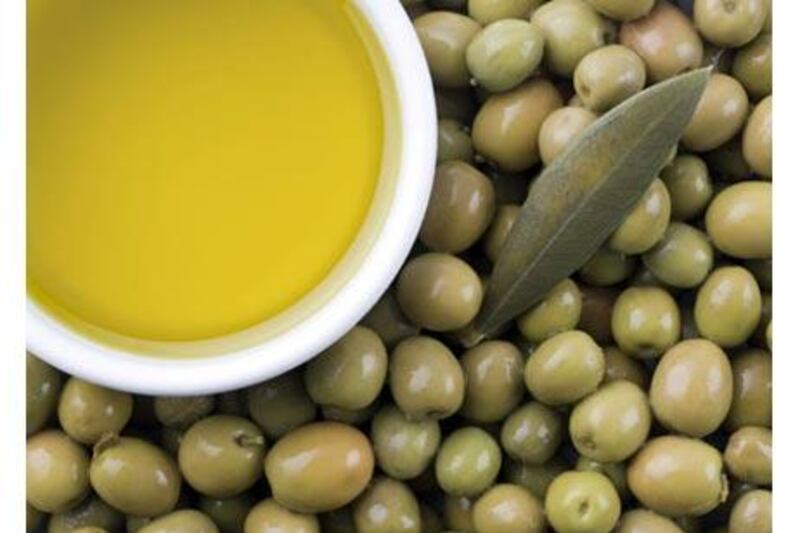Anyone who's dipped crusty bread into balsamic vinegar and olive oil or twirled a fork through spaghetti aglio e olio would agree with Chef Marcello Rivetti when he calls olive oil "a pillar" of Italian cuisine. "Extra virgin olive oil is one of the principles of good, healthy Italian food," says Rivetti, the executive corporate chef for Bice International - headquartered in Dubai - which oversees Bice restaurants outside the US.
We're on the terrace of one of the newest, Bice Mare, looking out on the pool and fountains between Souk al Bahar and Burj Khalifa. Between us stand several slender bottles with silver spouts, three of the nine varieties of olive oil used in the restaurant. "This one," Rivetti says, turning the bottle so I can see the label, "is numbered. The company produces only 2,000 bottles a year. Maybe." But maybe we're getting ahead of ourselves. I still don't understand the difference between extra virgin olive oil and plain olive oil, except that I prefer the deeper, stronger flavour of extra virgin, even for baking.
"Extra virgin is the simplest process," explains Rivetti, who's worked in Italian restaurants from Seoul to Singapore, Paris to New Zealand. "The olives are picked, then mashed within 48 hours. More than 48 hours and the acidity level and bitterness will be too high. Extra virgin can only have up to point eight per cent acidity. If there's more, it's olive oil." Mashing is also critical. "The best is when the olives are mashed cold," says Rivetti, adding that the machinery is simple: a massive stone wheel that turns, crushes and macerates the olives. "A mill basically, with the stone keeping the oil cold." And the pits? Rivetti smiles. "They're mashed right into the oil."
This little primer is, of course, a drop in the bottle. One could talk and read and write about olive oil forever, including debating whether the first olive trees were grown on Crete or in Syria. (The Romans were the first who actually produced olive oil.) Still, there are several points Rivetti wants to impress upon me. First, the health benefits: "Extra virgin olive oil is good for our hair, skin and metabolism. It's full of vitamins, contains 'good' cholesterol and antioxidants. It's the doctor of olive oils."
To find the healthiest blends, he suggests a careful read of the label. "Look for cold-pressed extra virgin and nutrition facts, such as the acidity level. A serious company will include this." Of course, Rivetti, whose childhood was spent in his grandmother's kitchen in Breschia wearing an apron and standing on a chair next to her ("something in my DNA"), knows numbers tell only part of the story.
"There are a thousand things that affect the taste. Different climates have different soils. In Italy we have more than 100 different varieties of olives, which are then combined into an unlimited number of blends. In Tuscany, for example, the salinity from the sea carried by the wind gives a particular flavour to the olive oil." Diners have begun filling the tables around us - it's nearly lunch time and the chef is needed. But for that moment he's somewhere in an olive grove in Italy.
Yes, it's great for frying, cooking and whisking into dressings and marinades. But what about sweet baking with olive oil? Chef Rivetti created the cake below for one of his earlier restaurants and loves its "fragrant taste" and "light consistency". Makes 20 squares. Ingredients 200ml orange juice, freshly squeezed and strained (about 3 oranges)
¾ tsp baking soda 4 eggs 370g caster sugar 180ml extra virgin olive oil 225g plain flour 2 heaping tsp baking powder 50g cocoa powder Method Pour the orange juice into a small saucepan and bring to a boil. Stir in the baking soda (it will fizz) and leave to cool for 20 minutes. Preheat the oven to 180°C. Grease a 23cm x 30cm x 5cm baking pan with olive oil and set aside. In a large bowl, beat the eggs, sugar and olive oil with a mixer. Sift the flour, baking powder and cocoa together into another large bowl, then whisk to thoroughly combine. In three additions, combine the dry ingredients with the olive oil mixture, beating well. Mix in the cooled orange juice. Pour the batter into the prepared pan and bake for 35-40 minutes until the cake is risen and firm and a cake tester comes out clean. (Be careful the edges don't burn before the centre is fully baked - you may need to tent the outer edges with foil for the last 10 minutes of baking.) Run a knife around the edge and cool completely.






